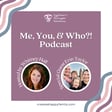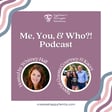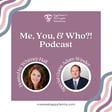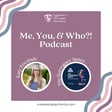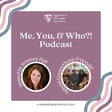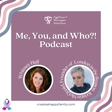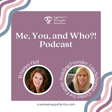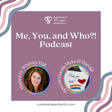Introduction to Casey O'Connell and Estate Planning
00:00:02
Speaker
On today's episode, I have the pleasure of speaking with attorney Casey O'Connell, who specializes in a estate planning, particularly with assisted reproductive technology at Klein Fertility Law. While we've heard from our attorneys before, Casey focuses on a different part of the process as he dives deep into the critical importance of estate planning. In this episode, we explore what estate planning actually means and why it's essential, especially when it comes to decisions around genetic material, when you should start the process and that crucial step. So if whether you are just beginning this journey or you're already in the middle of the process or even beyond, this episode is packed with valuable insights that you won't want to miss. Enjoy.
Whitney Hall's Journey and Podcast Mission
00:00:54
Speaker
who? Who knew it would take more than two people to have a baby? In a world where infertility is no longer a taboo topic, this podcast will take you through all of the different aspects of surrogacy and egg donation through the lens of many who walk this journey in different ways. My name is Whitney Hall, and I am a two-time Surrogate Now Turned Surrogacy Coordinator for Egg Donor and Surrogate Solutions. the very agency I used when I chose to carry for two amazing families. With this podcast, it is our goal to help guide and support you as you learn about what it takes to grow a family in an alternative way, as well as hear inspiring and beautiful stories of how this path has changed lives forever. We can't wait for you to hear about just one more way happy families are created every day.
Casey's Path to Reproductive Tech Law
00:01:48
Speaker
Casey, thank you so much for being here. I just so super appreciate your time. Absolutely. I'm happy to help. Glad for the opportunity and thanks for having me. Yeah, of course, of course. So let's just dive right in. Tell me, you know, just for those who are listening and just all of that, what is art law? How did you get into it? It's such a niche practice, right?
00:02:14
Speaker
Yeah, absolutely. It's a small little world here. So assisted reproductive technology law, the laws of you know ownership of genetic material, parental rights with the use of assisted reproduction, and every little detail in between. So some of that that ties into that is estate planning. And that's what we're here to discuss today. But yeah I ended up in this field because the owner of our firm, Brian Klein, is a close friend of mine from college. And his dad, the founder of the firm, Steve Klein, I've known his family for a long time. And we went to law school at the same time. And after law school, he started working for the firm with his father. And I went my way and then kind of rejoined and I joined the firm in 2019. So just known about it for a long time. And then on a more personal note, I had some fertility issues myself. And so as an attorney, I thought I had an opportunity to help people. And it just kind of all aligned like that. You know, one of those serendipitous things.
00:03:11
Speaker
Yeah. Oh, that's beautiful. That's beautiful. So I'm sure whenever you were going through law school, you never thought that this would maybe be the thing. No, estate planning. Yes, I did have an interest in that. But art law, no, that was an added interest due to some personal circumstances and then just from knowing Brian. So yeah, <unk> been it's been exciting. Oh, for sure. I joined the firm in 2019. Oh, gosh, yeah, absolutely.
Importance of Estate Planning for Genetic Material
00:03:36
Speaker
Absolutely. So you've already brought it up, you know, estate planning. And I know for me, when I think estate planning, I kind of jumped to this idea of like, oh, estate, like big houses and lots of property and trust funds and, you know, all kinds of things. But, and you don't yeah think of estates when you think of art law and like you said, you know, genetic material and and just that kind of thing. So tell us a little bit more about why that aspect is so important to know about.
00:04:06
Speaker
Yeah, so there's there's quite an intertwining nature to these two fields. Obviously, you're starting a family or growing your family if you're an internet parent. Most people who have a child, that's one of the biggest motivators for them to sit down with an estate planning attorney. Because as part of an estate plan, you're defining what happens not just when you die, but when you're alive and incapacitated or if you're just unable to care for your child for some reason, whether it's temporarily or permanently. And so a lot of that ties into your estate plan. A nomination of guardianship to make sure you have a trusted family member or friend to be available to care for your child. And then also obviously directing a disposition of your assets to your children or to whomever you wish. That's all part of the estate plan. So while the word estate makes you think of you know big ranches and wealthy people like you just alluded to, estate just really means everything you own, including your debts.
00:05:00
Speaker
So, everything you own at the time of death is your estate, whether that's, you know, a bank account or a huge house or, you know, horses or fancy cars. It can be anything from someone of no means to someone of significant means. And setting forth your wishes in writing in an estate plan just avoids a lot of potential problems, even for smaller estates. And a lot of the expenses that are required of a court proceeding when you pass away can be avoided if you set forth your wishes in writing. Sure, sure. And that's just super important for life in general. Obviously in you know the world of egg donation and um you know just that's an even bigger thought to think about when you're looking at genetic material. So what is, I mean, and a lot of times intended parents are so focused on, you know hey, we've just we're just trying to get to that baby part, but why is it so important? because
00:05:58
Speaker
Yeah, exactly right the fun stuff. Um, but there's so much before that and you do have to think about kind of that genetic material aspect um When it comes to that, so what does that look like and why is that so important?
Limitations of Clinic Forms vs. Legal Documents
00:06:12
Speaker
Yeah, so at any clinic they're gonna offer you an opportunity to sign some sort of form or internal agreement that is a disposition of Those assets so under the law those genetic materials whether they're donated or they're your materials are considered property So when someone passes away and needs to be directed somewhere or destroyed or there needs to be some sort of instruction provided by the owner And some of that can be constrained by the egg donation agreement or sperm donation agreement or embryo donation agreement that you've entered into There could be prohibitions on further donation for the purposes of procreation in those agreements So oftentimes the clinic will have an internal form a disposition form what happens if you pass away, right? So, you know, where do you want your eggs to go? Where do you want your embryos to go? What do you want to do with them?
00:06:58
Speaker
That being said, sometimes those clinic forms do not quite satisfy the wishes of the parties. And that's where I can step in and provide advice and personalized tailoring of an agreement in that regard. So oftentimes people don't think about what happens if you divorce, if you're married and have these genetic materials stored. Who do you want to take custody or ownership of the genetic materials, particularly embryos in that situation? And then also what happens if one of you is incapacitated? Can the other spouse use the genetic materials? Can they donate the genetic materials if you're not able to consent at that time?
00:07:34
Speaker
And then obviously what happens if one of you or both of you dies, where do you want the frozen genetic material to go? So some of that is set forth in those clinic forms, but oftentimes people want to add some detail, particularly if it's a married married couple. They want to make sure that they cover their bases if if a divorce occurs in the future. So obviously we're hoping for people to stay together. We don't want to divorce that part of life. And as you go through these assisted reproduction procedures, In my opinion, it's important to plan out the future just as if it's part of your state. And so those documents become valuable parts of of your, you're setting forth your wishes in writing. So what is the difference? you You mean you're alluding to these clinic forms. ah Do they hold just as much weight as this, you know, kind of legal estate is that, I mean, I think a lot of times you're, oh, go ahead. I'm sorry.
00:08:31
Speaker
Oh, sorry. No, yeah. The clinic forms are enforceable documents. Um, oftentimes though, there are kind of pre-selected box selections. So it's, you know, check this box on what you want to do with your sperm or or check this box on what you want to do with your remaining embryos. And oftentimes there's nuances that, um, those forms don't accomplish. Um, particularly like I, like I mentioned for, for married couples, oftentimes they might want one spouse to take ownership of all the embryos that are not used. Um, there could just be little, um, things in there that are not addressed by those pre-populated forms. So they might want to add some detail, um, that are not available in those clinic forms, but those clinic forms are certainly enforceable would be presented to a court as part of a probate administration saying, you know, here's what they selected to do. They want their embryos destroyed or XYZ, whatever says the form. Um, yeah.
00:09:17
Speaker
So if you wanted a little bit more detail or personal tailoring done to that to those wishes, then I can step in and help you with that. Make it part of your will or as a standalone document, whatever it may be. Okay.
Genetic Materials as Estate Assets
00:09:29
Speaker
Okay. And so if somebody has genetic material, they've already gone through and kind of did their boxes, you know, but they're looking back now and they're thinking, okay, we now actually need to further address this situation in nuance. How does that aspect work? You just kind of, I guess, take that, clinic forum and make it bigger, I guess, or make it more nuanced? Yeah, we just sit and listen to what they want to achieve and then try and put it into some sort of written document that achieves their objectives. Okay. So for example, there was a same sex couple that I helped, a male couple, and they have embryos from each of their sperm. So they want to set forth that the
00:10:11
Speaker
sperm contributor takes their embryos and so that they separate their assets. It's not just one pool. They wanted to make it clearly defined that each one would take either their frozen sperm or their embryos back if they were to split up. And that just wasn't the little nuances that they wanted in there weren't accomplished by the clinics form. So I helped them with that in writing. you know, make clear in the agreement that I drafted that it supersedes any clinic designations or or wishes that they've set forth. So there's no thats your conflict between the documents. Okay. Okay. That makes a lot of sense. That makes a a lot of sense. So for those who, you know, haven't thought of that, what, you know, what, what have maybe been some of the issues? What does happen to those embryos whenever they kind of, when you're faced with an unforeseen event?
00:11:02
Speaker
Yeah, so they become part of the estate. So if someone passes away unexpectedly and they still have frozen embryos, they're they're an asset or a piece of property of that person's estate. So estates are administered in a number of ways, the most common of which is to go through a probate proceeding with the court. um And if you have nothing set forth in writing, so no will, no trust, no written wishes, then your estate is administered according to the probate code of the state in which you resided and passed away. or or the state in which the asset is located, if it's a different type of asset. But for these assets, oh it most likely would be administered according to the rules of the state in which you lived and passed away. In that event, it would just go to your next of kin, so that could be a spouse, that could be children, grandchildren.
00:11:49
Speaker
And then it's up to them to decide what they want to do with it. But this is the important part is if you don't want those assets used, if you don't want your genetics used for certain purposes, if you don't want them destroyed, or if you want them used for procreation and further donated, all that needs to be arranged through your disposition agreement or your your trust or will. If you want certain wishes to be honored. So if you avoid doing that or if you neglect doing that and you pass away unexpectedly, then it's subject to the laws of the probate code of the state in which you live. And that's not what everybody wants to have happen, of course. Sure. And by subject to the law, do you mean, and and and forgive me for not knowing. You know, that's a good question. sorry um
00:12:34
Speaker
that there's kind of standard dispositions of the states through the probate code in the state in which you live. So for example, in California, when someone dies and they're married, most of their assets are going to go to the surviving spouse. Um, so in a community property situation like that, at least 50% of the assets go to the surviving spouse. Um, if not more, depending on the number of children you have, and then the rest of the assets go to children or grandchildren, depending on who survives you. So, um, if you're not married, then it goes to children. If no children, then grandchildren, if no grandchildren, then it reverts back to older generations. So grandparents, parents, siblings, nieces, nephews, aunts, uncles, some sort of family member. Right.
00:13:13
Speaker
Yeah, there's there's some sort of statutory structure for where your assets go if you don't define it yourself in a will or trust. Okay.
Avoiding Legal Disputes with Proper Documentation
00:13:21
Speaker
Got it. Got it. So, and then again, it's being viewed as property. So there's not any specifics to, okay, because this is genetic material, we have to treat this differently as opposed to a house. Although Alabama has made things super fun and different and interesting. Yeah. but there They're trying to complicate things a little bit in Alabama, but yeah. So as of now, the frozen genetic material is considered property. And yes, it would be distributed to whoever is rightfully going to inherit from your estate.
00:13:58
Speaker
That being said, it's important to keep these things in mind because oftentimes in egg donation and sperm donation agreements, there are restrictions on the uses of the donated genetic material. you know The donor doesn't want the recipient to further donate for certain purposes like procreation, either without their consent or at all. And so if those restrictions are imposed in a egg donation or sperm donation or embryo donation agreement, then you have to honor those with your estate wishes as well. so you know, it takes careful examination of your egg donation agreement if you have one or sperm or embryo donation agreement if you have one to recognize those further restrictions and then carry them forward in your estate plan. So all that careful planning is is important to make sure that you're not in violation of the terms of the egg donation agreement because even after you've passed away, if for some reason an egg donor or sperm donor found out that you violated that agreement, they could bring suit against your estate. So for example, I Let's say I donated sperm to someone and they, and I put a prescription in the sperm donation agreement that you can't use this with anybody else for procreative purposes. Don't give it to your friend. Don't give it to your family member. Only you can use my donated sperm. Well, it turns out that that person passed away and then through their program to state, it went to somebody else and they used it for procreation. And I found out about it regardless of heck.
00:15:21
Speaker
excuse me regardless of how that may take place practically, whether I find out about it or not. If I did, I could say, hey, you've reached this contract. You didn't make sure that these, my donated genetic material was not used further for appropriated purposes. And, you know, I could potentially seek a breach of contract claim against your estate. So even after you've passed away, you can be sued. It's kind of a scary situation. Yeah. but so the The larger point being you want to make sure your wishes are set forth in writing, particularly with these assets. They're very sensitive assets. It's not like a bank account that you're distributing to a family member. Um, these were obviously intended for you to build a family and you want to make sure that they're going to whom you want them to to go to and that they're treated according to the terms of the the contracts you've signed. Sure. Absolutely. So that's interesting you bring that up because I was going to ask, you know, if you, if you have that direct legal agreement with
Egg Donation Agreements in Estate Planning
00:16:15
Speaker
you know, your egg donor and is that being used to consult with the drafting of that estate plan? So, intended parents need to really think about the estate aspect of it prior to even going into egg donation because that draft or that contract is used to plan the estate is what I'm understanding that you're saying. Should be, yeah, absolutely should be. If you have a donor involved in your efforts to grow or or start your family, then that egg donation, sperm donation, embryo donation agreement needs to be presented to your estate planning attorney, for sure. Got it, on top of that clinic paperwork as well. Right, right, absolutely. So you know all of those things tie into the composition of your estate. And so any any estate planning attorney will tell you, I need to know what you own,
00:17:10
Speaker
what it's worth and how we're going to distribute it or what you want to do with it. And it could be as straightforward as saying, if I pass away, I want all my frozen genetic material destroyed. yeah Again, you can set that forth in your will. It could be as complicated as I want some of it to go to this person, and some of it to go to that person, and you know they can use it for XYZ purposes. Or I want to donate it to medical research, or common things that we see. So all those options are available to you. It's just a matter of getting it set forth in writing. um so it's not This can also lead to some disputes because you know ah oftentimes people are trying to have kids and if they pass away before they're able to achieve that, do you want your spouse to be able to have a kid with your genetic material after you're deceased? That's come up in the news a few times where parents are trying to have kids with their deceased child's genetic material or their surviving spouse is trying to have a kid with their deceased spouse's genetic material.
00:18:06
Speaker
um And, you know, that can lead to some legal disputes and court disputes because oftentimes family members will interject and say, you know, we don't want them to use the genetic material for that. And then it becomes a long protracted, litigated matter that could have been avoided if you set forth your wishes in writing. How does a family in the case of you have two spouses, one passes, They've created this genetic material, they choose to move forward. How can a family just come and say, we don't want you to do that? If they aren't part of the will, last will and testament or things like that, you can just sue anybody? Well, yes, you can sue anybody, but the the theory is that if they have another child, then it is a detriment to their interest in the estate. So what they're saying is that our deceased family member
00:19:02
Speaker
did not say you could do this expressly. So now if you have another kid, it's going to diminish my interest in the estate or I'm harmed in some way in that regard, or it's just flat out, I knew the deceased person and I know that they don't want you to do this after they're dead. you know And so I'm asserting their rights in contravention of europe your claim. So it just becomes a a litigated matter. And you know that can be avoided if you if you set up an estate plan and and carefully plan out what to do with these assets. so It's a, like I said, sensitive area of estate
State Laws and Estate Planning Implications
00:19:33
Speaker
planning. Not many people think about these things as property. And it's, you know, when you're creating embryos with the hope of creating life, you don't want to think about them as property, but that's how the law treats them until they're until you're a child. Sure, sure. So, and and again, we kind of alluded to this, you know, Alabama made things, you know, ah much more complicated and
00:19:58
Speaker
that's still kind of up in the air at the moment. But what are some of the things that kind of vary state by state when it comes to estate planning, art law in general that maybe intended parents need to be aware of when they're thinking about this? Yeah. So Alabama's ruling is limited to Alabama. So, you know, there's, that's in a confined world there. So there's, there's not much concern for people outside of Alabama with respect to that ruling. um But things that vary state by state for intended parents are the the way marital property works is the biggest one. So there are certain states that are community property states. I think there's 13 of those states. And then there's there's states that are non-community property states. And all that means is that's how you define who owns your property in a marital relationship is different. So in community property states, the spouses own equally everything that's acquired during the marriage. So unless it's by inheritance or a gift.
00:20:57
Speaker
So if we were married, um, and you know, your income every month, that's 50 50 between the two of us, my income every month between the two of us is 50 50. If we own a house, if we buy it as community property using community assets, it's a 50 50 split. So it just makes things. In theory, simpler in community property states that when you're married, everything in theory is 50-50. And then non-community property states, it's based on the contribution to the marital estate, how they define who owns what.
Community vs. Non-Community Property States
00:21:30
Speaker
So that's one of the biggest considerations is just marital property in general, how you define it and what state you reside in. The other differences, particularly with respect to assisted reproduction, are just concerns about disposition,
00:21:45
Speaker
um Who can use your your genetic material and what I've mentioned before is are you allowed to further distribute it to an error beneficiary. Oftentimes that's going to be set forth either by the laws of the state or by the agreements you sign with the clinic or by the agreements you sign with the donors. So if you're not using a donor, oftentimes there could be prohibitions on further donation of your genetic material or there could be restrictions on who can receive it or who can use it and for what purpose. Sure. And then obviously if you're using a donor, that'll be the mean that'll be defined by your agreement with the donor. Right, right. Outside of that, so it's really i mean it's really up to you to set forth what you want to do with it. so it's you know yeah To my knowledge, there's no prescriptions legal prescriptions on
00:22:33
Speaker
further donation of your genetic material as long as you set forth in writing who you want to go to. Right, which is why this is such an important part of the process, but not one that a lot think about. You're mostly just, you're you're just trying so hard to get to that baby part. Well, what we're thinking about in assisted reproduction is creating life, right? You're you're starting to, you you want to become a parent or you want to have another child. Yes. All that's you know, from, you get to experience the pregnancy and and be excited when the baby's born. No one wants to talk about what happens when you die. when you're going through ah
00:23:11
Speaker
the excitement of creating and a new baby. um So, you know, I understand that, but I like to try and reframe people's thoughts of, it's not so much what happens when you die, it's what happens. How can you protect your family? um So, you know, life is unexpected, but one thing you can expect is to die. And hopefully the circumstances are being surrounded by loved ones at at home and and, you know, looking back on all these great family events and achievements and things like that, but it doesn't always work out like that for everybody. So I encourage people to take steps, think ahead, plan to protect your family. And then you can move forward through your life with the peace of mind that they'll be taken care of if something unexpected does happen. Yeah, absolutely. Absolutely.
When to Start Estate Planning for Parents
00:23:49
Speaker
So what, you know, it, it can be incredibly overwhelming to, to think about your, you know, you are looking ahead to the excitement part of parenting. You don't want to necessarily think about, you know, kind of just the, the estate planning aspect of it. If you could create kind of maybe a perfect step by step,
00:24:09
Speaker
situation do you think do do you do the estate part prior to you know having your you know contract with your egg donor what what's kind of like that perfect prescription and how would an intended parent start yeah that's that's a great question so i guess preferably they would um i i would My best advice would be to do this after you've created your embryos, um either either before you've been pregnant, a surrogate if you're using a surrogate, or before you're pregnant yourself. I would say get that part done first before you assess your estate. Now, oftentimes people already have estate plans when they come into this, um but a great majority of people do not. So if you're getting to the point of creating embryos, then it's time to start thinking about these things because all those disposition things that we just discussed come up
00:24:59
Speaker
What happens if one of you has a freak accident and is incapacitated? Do you want the other spouse to be able to continue? So after you've created embryos, it's probably the best time. The most common time, I guess, and as I alluded to before, is the great motivators when you have a child. Because now you have this little baby that you want to obviously take care of and you never know when you leave the house one day if something could happen. So that is really what will get people to take this more seriously. and approach it with intent. um ah That being said, again, i I try to counsel people not to think of this as fear, fear, fear. It's it's more protect your protect your loved ones. You went through possibly rounds and rounds of IVF yourself or rounds and rounds of attempts to become pregnant yourself.
00:25:44
Speaker
You now finally have got to the point you have this baby. Take seriously the obligations of your being a parent and not always being able to be there. And this is how you do it. you know Set up your estate plan, whether that be a simple will or a trust, that all depends on the composition of your estate. But ideally, you would do it no later than a few months after you've had the baby. I thought I'd mention is that you can always change these documents. So they're they're freely amendable, the revocable, you can change little aspects of them or them entirely at any point in the future. So you're not locked into anything you do um once you set this up. So if your baby's two months old and you obviously don't know much about how your child's gonna turn out at that point, and then by the time they're 18, they're perfect little angels and everything, then you can change your estate to you know accommodate that, or if they're little troublemakers, you can change your estate to accommodate that. So you know all these things can be updated and amended in the future.
00:26:40
Speaker
Got it. So as far as when you are going through the egg donation process and or, you know, the surrogacy process and you're thinking about, you know, just what would happen after and I have remaining embryos or, you know, things like that. It is still something to keep in mind when because you are going to have to think about the future drafting of this agreement. Yeah, i mean or this is long we have those right as long as you have that property, it's something that will need to be included in your estate. Now, it's a question that I ask because I'm involved in assisted reproduction, obviously. i don't Other estate planning attorneys, it might not cross their mind. you know They might not ask, oh, hey, how did you have your child? They just ask, do you have a child? Or you know they don't ask, hey, did you use assisted reproduction to have your child? you know it's It's not a common question from
00:27:36
Speaker
typical But if you're working within a state planner, as an intended parent, I would recommend that you mention this to them, especially if you have a frozen genetic material, whether it's donated or your own. Make sure that you disclose that to your state planning attorney because it it is something to be addressed in your state plan. Yeah, no, absolutely. That's, I mean, you're so right. I can't think of many estate planners that would think about the, how did your child come to be um asking that question for sure. More common, you know, maybe sometimes in the past they'd ask if it was adopted or if it's your natural child, but um you know, nowadays people are are more aware of obviously assisted reproduction as as the industry and the medical technology has developed and become more publicly known. But again, but you know, especially some of the older estate planning attorneys I've worked with,
00:28:25
Speaker
That's not something that crosses their mind. So make sure you make sure, sure. There
Advice for Intended Parents on Estate Planning
00:28:31
Speaker
you go. There you go. That's a good tip. That's a good tip. Do you have any other advice that you would give to intended parents as they're thinking about just this aspect of estate planning, you know, whether they are in the beginnings of even deciding if egg donation is how they're going to grow their family or, you know, Hey, we have nine year olds and genetic material and we have no idea what we want to do. Yeah, I would say act sooner than later. It's always better to plan ahead. you know and you know That's coming from a state planning attorney. I realize how that sounds, but I i genuinely mean this. If you want to be you want to achieve that peace of mind that you know your family will be taken care of, and again, this isn't just, oh, I could go and get in a car accident and pass away. This is what happens if I'm permanently disabled, and how does my family care for me? Sure. um you know How does that work with potential benefits that I have at my employment?
Financial Techniques for Family Protection
00:29:25
Speaker
Do I have disability insurance? Do I have life insurance? All these types of things that and financial techniques that people use to protect their families are a part of the discussion within the state planning attorney. So sure act sooner than later is what I would say. But I say that ad nauseam and most people will wait until they're around retirement age to set up an estate plan anyways. But it's up to you. if if you want If you're not a nervous person and you think everything's going to go fine, then have at it, but I would err on the side of caution and plan further ahead if I was you. Sure, sure. Absolutely.
Personal Insights from the Expert
00:30:02
Speaker
What would you say is maybe your favorite part about what you do? Just getting to know the clients. I really met some really interesting people and just
00:30:13
Speaker
As an attorney, typically when you think about attorneys, you think about disputes or litigation or you know courtroom fights or intense testimony. What we do is is is usually very,
00:30:28
Speaker
everyone's in agreement, right? So there's no dispute to address, there's no sides to take. We're all trying to help one another here. And that's really a ah very rewarding feeling. And so getting to know people when they're when they've gone through troubles of their own, trying to have kids, and now they're at this point, and they finally get to that point of achieving a pregnancy, it just feels good, it warms your heart, and that's what I enjoy the most. Yeah, for sure. For sure. Oh, I love that. I love that. Well, Casey, I really so appreciate you kind of taking the time and, you know, especially with something that is so niche and, um, but important and not something that you think about a lot, but this is so important and necessary in the process in general life in general, but then to think about that nuance of,
00:31:16
Speaker
genetic material and and and things like that. Well my final question to you and it's a fun one um for anyone who knows me they know that I just I cannot start off the day or have a very successful day if I have not had my cup of coffee we're a little co-dependent on each other um so I always like to ask what was the thing that filled your cup this morning? Whether it's literally or figuratively, what was the thing that filled your cup? Literally, coffee. I'm a heavy coffee drinker. I eat it every day. It sounds like we're very similar. Cheers to that. Figuratively. I have an eight-month-old baby, so waking up to him is pretty special. My wife and I love those special morning moments where we get to snuggle him a little bit in bed before the day starts. So that one makes my heart soar.
00:32:10
Speaker
oh My gosh, yes. Oh at eight months. So so very very cuddly and just oh right all open there in those little baby cheats He's a happy chunky little guy. So he's he's fun to snuggle with in the morning Oh, I love that. I love that. Well,
Conclusion and Podcast Wrap-up
00:32:25
Speaker
Casey, again, I am just, I'm so grateful to you and your expertise and um how you help our shared clients. And yeah, definitely, definitely. And we will put um just in our show notes, the the link to y'all's firm. And um again, I'm just so grateful that you're able to give us the expertise for something that is so niche and nuanced. So thank you for your time. I so super appreciate it.
00:32:51
Speaker
Absolutely, Whitney. Thanks again for having me. Appreciate it. And look forward to another chance maybe in the future. Absolutely. Thanks, Casey. Thank you so much for joining us on this episode of Me, You, and Who. We appreciate your time and hope you enjoyed our discussion today. As we wrap, we would like to remind you of some of the ways that you can stay connected with us and be part of the me, you, and who podcast community. Firstly, if you haven't already, make sure to subscribe to our podcast on your favorite platform. Hit that subscribe button so you never miss an episode and can stay up to date with our latest content. But that's not all. We also have an exciting YouTube channel where we share some bonus content behind the scenes, glimpses, and video versions of our episodes.
00:33:39
Speaker
Head over to YouTube and hit that subscribe button there as well and don't forget to click the notification bell so you'll be the first to know when the new episodes go live and for more exclusive updates, engaging discussions and a chance to connect with fellow listeners. Be sure to follow us on our social media accounts. You can find us on Instagram, Facebook and TikTok at create a happy family. If you're interested in finding out more about creating a happy family, please visit us at www.createahappiefamily.com. Thank you again for being part of the me, you, and who community. Your support means the world to us. I can't wait for you to join us next time as we continue to share stories and journeys of creating happy families.

